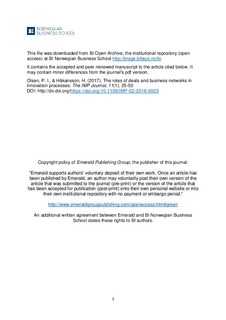The roles of deals and business networks in innovation processes
Journal article, Peer reviewed
Accepted version
Permanent lenke
http://hdl.handle.net/11250/2481014Utgivelsesdato
2017Metadata
Vis full innførselSamlinger
- Publikasjoner fra CRIStin - BI [1013]
- Scientific articles [2173]
Sammendrag
Purpose: The purpose of this paper is to analyze the roles of deals in innovations processes, based on the definition of a deal as the interaction of social-material value-creating processes with money-handing processes.
Design/methodology/approach:The paper is based on a study of the historical emergence of transaortic valve implantation (TAVI) as an innovative new technology in the area of thoracic surgery in a global setting. The study is based on a combination of interviews and secondary data analysis.
Findings:The authors found that deals play important roles in innovation processes as critical junctions that mark entries to different phases and generate major shifts in location as well as combination of resources, activities and actors. These shifts include radical changes in control, where actors in possession of resources necessary to bring the project through the next phase, move in to take control – thereby expanding their businesses to new growth niches. Based on the analysis of seven deals, the authors argue that the innovation process is a combined push and pull process where later stage entrepreneurial interests play very significant roles. Deals may also represent radical turning points and moves of the projects that set the project off in a different direction, usually also associated with shifting ownership control rights through the innovation and scaling process. The authors also argue that inventions in the periphery will tend to move to the areas with the most competent relevant business networks capable of adopting and expanding the innovation to a global business operation. The innovation process is not primarily about creating new resources and activities, but about recombining existing resources, competencies and activities. Supplier networks play particularly important roles in these processes.
Research limitations/implications: The authors suggest that the study indicates that IMP researchers should turn more attention to studying business deals and financial flows and influences – in particular in studies of innovations and innovation processes – to investigate the mechanisms by which new innovations interact with and transform existing business networks.
Social implications: This work highlights why and how an innovation that may initiate anywhere in the periphery, will tend to move to the most competent and capable networks around the globe, that are the most relevant to the needs of the innovation project. Hence, the more powerful business networks and eco-systems will tend to pull interesting inventions in from their periphery, and grow them effectively.
Originality/value: The paper expands the efforts in IMP theorizing to include financial/monetary interactions more explicitly into business network theory. It also aims at clarifying core IMP arguments toward entrepreneurship research, in particular research on international new ventures.
Beskrivelse
The accepted and peer reviewed manuscript to the article
